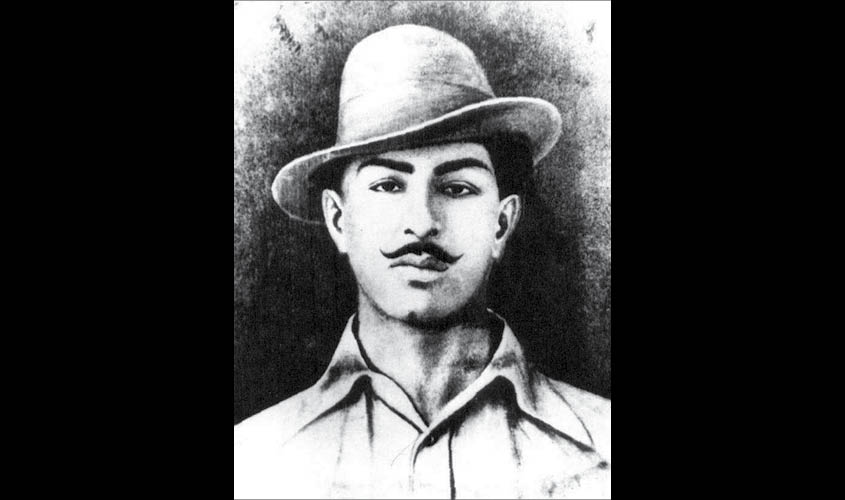During his time in prison, Bhagat Singh maintained a meticulous journal, recording his thoughts on politics, philosophy and literature. His Jail Diary is required reading for all, writes Renée Ranchan.
The unique distinction of being unquestionably regarded as one of the greatest sons of India, who fought for the country’s freedom, belongs to Shaheed Bhagat Singh. He was barely 23 when he was ruthlessly executed by the British in what till today is perceived as the most horrific example of the travesty of justice. However, his legend lives on even 87 years after he became a martyr along with his two associates—Rajguru and Sukhdev. The short span of his life has been inspirational not only for people in India but also for those who possess the zeal to liberate their countries from despots, dictators and autocratic regimes.
Among the iconic freedom fighters, he stands tall and singly unmatched, given his youth and commitment, backed by readings and comprehension of many a school of thought.
His 111th birth anniversary falls on 28 September, and an indebted nation remembers him for his revolutionary fervour to unshackle the country from the enslavement of the British Raj; though in both form and content he differed from the methods employed by the Congress leaders, preferring to take the alien rulers head on. His grand nephew, Yadvinder Singh Sandhu, has painstakingly compiled a book which is an incorporation of Bhagat Singh’s beliefs, quotes penned by him, over a period of time, as a “Jail Diary”. The journal was handed over to the freedom fighter’s father, Sardar Kishan Singh, after he was dismissively hanged by the British authorities. Sandhu later inherited the diary from his father, Babar Singh, who was the custodian of the hand-written and meticulously cloth-bound (red) notebook comprising 202 leaves of a little over 21 cm x 16 cm, held together with a long tag. He decided to share the contents of the notebook since he wanted Bhagat Singh’s original thoughts, written with calligraphic flourish, to be compiled in the form of a memoir, putting to rest all speculation, regarding his revolutionary character, termed erroneously by some historians as bordering on terrorism.
Jail Diary is a panoramic sweep of the young man’s life lending the reader a keen insight into his unshakeable conviction upon which he acted down to his last breath. It is remarkable that he, at such a young age, was so well read and conversant with political philosophers such as Karl Marx, John Stuart Mill, Friedrich Engels, Leon Trotsky and Bertrand Russell that he could quote them verbatim, explaining in detail the nuances of their tenets. Contrary to the fact that he had deeply delved into the doctrine of path-breaking political thinkers, he was a poet at heart, readily reciting couplets from the Rubiayat of Omar Khayyam. However, no contradiction here, since the Rubiayat is simply a depth rendering, philosophically speaking, of Freedom, of ultimate Freedom!
Bhagat Singh never failed to question Congress stalwarts, and, on page 277, observed, “How many of western educated Indians who have thrown themselves into the political agitation against the tyranny of the British bureaucracy have ever raised a finger to free their own fellow countrymen from the tyranny of those social evils? How many of them are entirely free from it themselves or, if free, have the courage to act up their opinion.”
Bhagat Singh was also drawn into the liberating Arya Samaj movement founded by Swami Dayanand. Commenting on the Arya Samaj’s resolve to keep itself away from political activity (page 285), he remarks that he accepted, “This declaration as disassociating the Arya Samaj as a body from extremist politics. It should be noted in fairness to the orthodox Hindus that while the Arya Samaj does not include perhaps more than five percent of the Hindu population of Punjab, an enormous proportion of Hindus convicted of sedition and other political offences from 1907 down to the present day (March, 1931) are members of the Samaj’’. He further perceives, “The Arya Samaj is a nationalist revival against the Western influence; it urges its followers in the Satyarth Prakash, the authoritative work of Dayanand.”
A quote from his Jail Diary succinctly portrays the relevance of his thought. “The Indian National Congress assumed into itself, almost from the beginning, the function of a Parliament. There was and is no room for a Parliament in India, because, so long as the British rule remains a reality, the Government of India, as Lord Morley has plainly stated, must be an autocracy—benevolent and full of sympathy with Indian ideas, but still an autocracy.’’
Bhagat Singh’s concerns for the Constitution of Free India, as well as on the role of Princes, Untouchables (page 279) and numerous equally serious matters, reflect that despite his chronological age, he had a visionary perspective. His personal chronicle now made privy to the public—and brought out with the nostalgic feel and texture of a well-preserved diary by Prabhat Paperbacks—is a treasure-trove of photographs of his family, replete with his parents, uncles and his bhabhi Durga, who valiantly facilitated his escape from Lahore after the gunning down of J.P. Saunders, a British officer, mistakenly killed by Rajguru due to his resemblance with James Scott, who ordered the lathi charge resulting in the death of Lala Lajpat Rai.
To put this pen down with his final words, “Dil se niklegi, na mar kar bhi, watan ki ulfat, meri mitti se bhi khushboo-e-watan aayegi [Even after my death, the love in my heart for my motherland will remain everlasting…my ashes will keep emanating the fragrance of its soil].”
Bhagat Singh: Jail Diary; Presented by Yadvinder Singh Sandhu (Grand nephew of Shaheed Bhagat Singh); Prabhat Paperbacks; Pages: 288; Price: Rs 400

